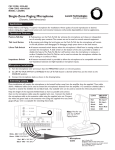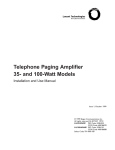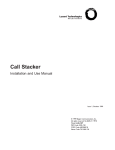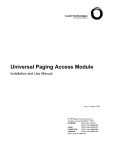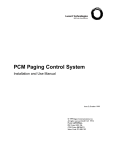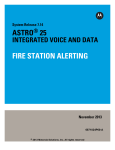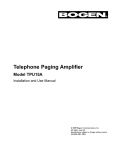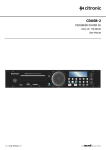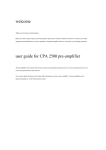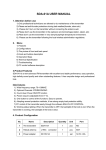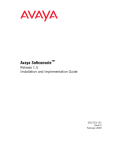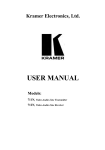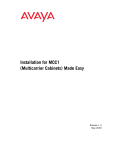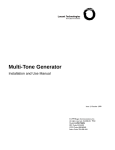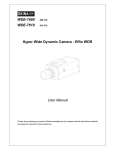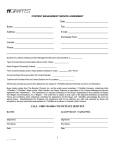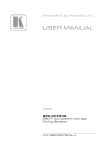Download Manual - Avaya Paging Solutions
Transcript
Ambient Level Controller Installation and Use Manual Issue 1, October 1999 © 1999 Bogen Communications, Inc. All rights reserved. 54-2028-01 9910 Model: LUALC PEC Code: 5335-621 COM Code: 408184273 Select Code: 701-000-131 © 1999 Bogen Communications, Inc. All Rights Reserved. Printed in U.S.A. Notice Every effort was made to ensure that the information in this guide was complete and accurate at the time of printing. However, information is subject to change. FCC Statement (Part 15) - Radio Frequency Interference The Ambient Level Controller generates and uses radio frequency energy and, if not installed and used in strict accordance with the manufacturer's instructions, may cause interference to radio and television reception. Testing is being conducted for compliance with the limits for a Class B device in accordance with the specifications in Part 15 of the FCC Rules. This testing is designed to provide reasonable protection against such interference. However, there is no guarantee that interference will not occur in a particular installation. If this equipment does cause interference to radio or television reception, which can be determined by turning the Ambient Level Controller unit off and on, the user is encouraged to try to correct the interference by one or more of the following measures: - Reorient the radio or TV receiving antenna. - Relocate the Ambient Level Controller unit with respect to the radio or TV receiver or vice-versa. - Plug the Ambient Level Controller unit into a different outlet so that it and the radio or TV receiver are on different branch circuits. If necessary, the user should consult the dealer or an experienced radio/television technician for additional suggestions. The user may find the following booklet, "How To Identify and Resolve Radio-TV Interference Problems," helpful. This booklet was prepared by the Federal Communications Commission (FCC) and is available from the U.S. Government Printing Office, Washington, DC 20402. Stock order No. 004-000-00345-4. Important Safety Information Always follow these basic safety precautions when installing and using the system: 1. Read and understand all instructions. 2. Follow all warnings and instructions marked on the product. 3. DO NOT block or cover the ventilation slots and openings. They prevent the product from overheating. DO NOT place the product in a separate enclosure or cabinet, unless proper ventilation is provided. 4. Never spill liquid on the product or drop objects into the ventilation slots and openings. Doing so may result in serious damage to the components. 5. Repair or service must be performed by a factory authorized repair facility. 6. The product is provided with a UL-CSA approved, 3-wire ground type plug. This is a safety feature. DO NOT defeat the safety purpose of the grounding type plug. DO NOT staple or otherwise attach the AC power supply cord to building surfaces. 7. DO NOT use the product near water or in a wet or damp place (such as a wet basement). 8. DO NOT use extension cords. The product must be installed within 6 feet of a grounded outlet receptacle. 9. DO NOT install telephone wiring during a lightning storm. 10. DO NOT install telephone jacks in a wet location unless the jack is specifically designed for wet locations. 11. Never touch uninsulated wires or terminals, unless the line has been disconnected at the paging or controller interface. 12. Use caution when installing or modifying paging or control lines. Support Information Paging systems integrated with small phone systems such as Merlin Legend and Partner are supported by the National Service Assistance Center (NSAC). The main number for the NSAC is 800-628-2888. Paging systems integrated with large switches such as the DEFINITY G3 are supported by the Technical Service Center (TSC). The main number for the TSC is 800-242-2121. Contents Page 1. Overview ....................................................................................................................................1-1 Features ............................................................................................................................1-2 Specifications ....................................................................................................................1-4 Before You Start ..............................................................................................................1-5 2. Operation .......................................................................................................2-1 Front Panel Setup ............................................................................................................2-2 Manual Use of the FM-15 Ambient Level Controller ............................................2-3 FM-14 Log Current Microphone Hookup ................................................................2-4 3. Installation .......................................................................................................3-1 Power Supply Hookup....................................................................................................3-2 Mounting Detail................................................................................................................3-3 Ambient Level Controller Connection With LUUPAM Universal Paging Access Module................................................................3-5 Ambient Level Controller Connection With LUPCM Paging System ................................................................................3-6 This page intentionally left blank Overview 1 Contents Features 1-2 Specifications 1-4 Before You Start 1-5 Overview 1-1 Features ■ Allows automatic, manual or remote control of sound system levels. ■ It has an SPL meter with over 50 dB range built in. ■ The microphone can be placed up to 5000 feet from unit. ■ Simplicity in set up and operation. ■ Single rack space - 1 RU. ■ Balanced 600 ohm inputs and outputs. ■ Line input activated by a contact closure. ■ Loop start TELCO input with priority over line input. ■ Clock inputs or remote control connections. ■ Relay outputs for emergency override or indicators. ■ Line output and a contact closure to supervise downstream equipment. ■ Internal microprocessor senses ambient noise via a microphone input, and adjusts the paging level accordingly. ■ Rack or wall mount. ■ UL listed power supply, FCC Part 15 approved. Figure 1-1 shows a back view of the Ambient Level Controller (ALC) and Figure 1-2 shows a front view of the ALC. Figure 1-3 shows a block diagram of the ALC. 1-2 Overview Power Input 24 Volts AC Line In Telco In Loop Start C1 G + - Clock Inputs or Remote Control -24dB -24dB -18dB -12dB -6dB Relay Outputs Shield Model FM-15 + - Mic Only Mic Only Line Out Output Level NO 1 C NC NO 1 C NC NO 1 C NC NO 1 C NC C1 C NO C 1 NO C 1 NO C 1 NO C 1 NO C 1 Figure 1-1. Back View -18 dB -24 dB Manual Level Control Noise Level dB SPL -12 dB 100dB -6 dB 90dB 80dB 70dB 60dB Paging Level dB 105dB Full Volume 95dB -6 dB 85dB -12 dB 75dB -18 dB 65dB -24 dB Set Maximum Noise Level 95dB 100dB 90dB 85dB 105dB Power Automatic Level Control Telephone Input Active Figure 1-2. Front View 4 to 20 Mil Rec. 0 to 5 Volt LED Driver 4 Bit Converter 0 DBM Audio Detect Gain Hold C1 4 Bit Converter One of 8 AGC 0 dB -6 -12 -18 Loop St Clock Inputs FP Manual or Automatic Level Control Selection Micro 68HC705 G X 1 Buffer 4 Volume Control Over-rides for High Noise Level LED Display X 1 Buffer or Level Set 600 600Ohm Ohm Bal line Bal line Driver Driver FP Selector for Max. Noise -24 FP PA Level Display Figure 1-3. Ambient Level Controller Block Diagram Overview 1-3 Specifications Table 1-1 lists the specifications for the ALC. Table 1-1. Specifications Parameter Working Limits Power Source 24 Volts AC UL listed power supply Maximum Power Consumption 60 Watts Frequency Response 250 Hz to 15KHz +/- 2dB Signal To Noise [dB ref.] Better than -60 dB Maximum Output Level 0 dB,-12 dB with jumper Output Relay Trigger Points 0 dB and -6 dB gain reduction Output Relay Contact Rating 1 amp No. of Relay Contacts 4 Input Level Controls [internal] 5 Control requirements DRY contact closure Input Types Line Telco, loop start Output Types Line [600 ohm] Contact Closure On Output Yes Contact Closure Controlled Input Yes Front Panel Controls Attenuation manual or automatic Front Panel Indicators Power Attenuation, automatic Telephone input active REAR PANEL CONNECTORS 1-4 Overview Relays Compression screw Microphone RJ11-6 or compression screw Line In Compression screw Line Out Compression screw Telephone RJ11-6 Relay Outputs Compression screw Clock Inputs Compression screw Power Compression screw Microphone Type Electret, omnidirectional Maximum Mic Line Length 5000 feet Table 1-1. Specifications (Continued) PHYSICAL Depth 8-3/4 inches Width With Rack Ears 17 inches 19 inches Height 1-3/4 inches Weight 8 pounds ENVIRONMENTAL Temperature Operating +32° to +104°F (0 to 40°C) Humidity 0 to 85% Noncondensing Before You Start Before installing your system, read and understand the safety instructions. Be sure you have all the necessary parts, tools, and test equipment, listed below. Check the shipping container for the following contents: 1. FM-15 Ambient Level Controller. 2. FM-14 Log Current Microphone. 3. Rack mounting ears. 4. Rack mounting hardware (4 Phillips head 12-24 screws, 8 Phillips head 632 screws). 5. RJ-11 cord. 6. Power supply. 7. Installation and User Manual. 8. Male RCA to wires cable. Overview 1-5 This page intentionally left blank 1-6 Overview Operation 2 Contents Front Panel Setup 2-2 Manual Use of the FM-15 Ambient Level Controller 2-3 FM-14 Log Current Microphone Hookup 2-4 Operation 2-1 Front Panel Setup Set up the FM-15 ALC as follows: 1. Set the MANUAL LEVEL CONTROL to automatic (Blue Knob) (see Figure 2-1). This allows the FM-15 ALC to calibrate itself.The automatic position will allow the FM-15 ALC to constantly change the paging level to compensate for the changes in noise level in the area being monitored. 2. Check the SPL meter (the Green LED) (see Figure 2-1) for maximum noise level. This is your high noise level reading. 3. Set the MAXIMUM NOISE LEVEL control (Red Knob) (see Figure 2-1) to the average high noise level. If you feel the room noise may actually be louder at some time, move the control up one click to the right (clockwise). 4. The PAGING LEVEL meter (the Red LED paragraph) (see Figure 2-1) indicates the paging level changes that are taking place with dual LEDS. 5. Calibration is complete. Telephone Input Active Automatic Level Control -18 dB -24 dB Manual Level Control Noise Level dB SPL -12 dB 100dB -6 dB 90dB 80dB 70dB 60dB Manual Level Control [Blue Knob] SPL meter [Green LED] Paging Level dB 105dB Full Volume 95dB -6 dB 85dB -12 dB 75dB -18 dB 65dB -24 dB Paging Level [Red LED] Figure 2-1. FM-15 ALC 2-2 Operation Set Maximum Noise Level 95dB 100dB 90dB 85dB 105dB Maximum Noise [Red Knob] Manual Use of the FM-15 Ambient Level Controller The FM-15 ALC may be used without the FM-14 Log Current Microphone. In this mode, the FM-15 ALC becomes a leveler or limiter for manual control of the sound system. The SPL meter will not function but all other functions will work in the normal manner. The Manual Level Control on the front panel will set the level of the sound system (see Figure 2-1). The Output Level Control (see Figure 2-2) is preset at the factory for a 0 dB maximum output level. The Enable Contacts (see Figure 2-2) on the Line Input terminal strip, when shorted with a DRY contact closure, will produce an isolated DRY contact closure on the C1 and C terminals of the Line Output terminal strip. -12 dB Output Level Control J6 Minus 12dB Jumper Telco In Loop Start Line In C1 G + - Line In Enable Shield TOP VIEW Output Level Line Out + - Mic Only C1 C Line Output Enable Figure 2-2. FM-15 ALC Rear View Operation 2-3 FM-14 Log Current Microphone Hookup The wire for the FM-14 Log Current Microphone does not have to be shielded. Use an RJ-11 connector at the microphone. When connecting to the FM-15 ALC use an RJ-11 connector or wire directly to the terminal strip marked MIC ONLY (see Figure 2-3). OR Output Level Line Out + - Mic Only NOTE: These terminals are redundant MIC input connections, useful when a Modular RJ-11 Plug and cable is not suitable. Mic Only NO 1 C C1 C Figure 2-3. FM-14 Log Current Microphone 2-4 Operation Installation 3 Contents Power Supply Hookup 3-2 Mounting Detail 3-3 Ambient Level Controller Connection With A LUUPAM Universal Paging Access Module 3-5 Ambient Level Controller Connection With LUPCM Paging System 3-6 Installation 3-1 Power Supply Hookup Power Input 24 Volts AC Telco In Loop Start Line In C1 G + - BLACK WHITE RED GREEN Model FM-15 Shield Install the FM-15 ALC with the system to be controlled. Then install the FM-14 Log Current Microphone in the area to be controlled. Connect the power supply provided as marked on the PC board (BLACK-WHITE-REDGREEN, from left to right) (see Figure 3-1). POWER SUPPLY 24VAC 1.6 60 HZ DO NOT DEFEAT THE SAFETY GROUNDING PIN ON THE POWER LUG. Figure 3-1. Power Supply Hookup 3-2 Installation Output Level Line Out + - C1 C Mounting Detail The rack ears mount in any of four directions (see Figure 3-2). This makes rack mounting or wall mounting possible. The power supply can be mounted in any convenient place. FRONT DETAIL 1.750 Typical -18 dB -24 dB Manual Level Control -12 dB 99dB -6 dB 87dB 75dB 63dB 52dB Noise Level dB SPL 105dB Paging Level dB Full Volume 93dB -6 dB 81dB -12 dB 63dB -18 dB 53dB -24 dB Set Maximum Noise Level 93dB 99dB 87dB 81dB 105dB Power 19" PHILLIPS HEAD #12-24 (TYPICAL) REAR DETAIL Figure 3-2. Rack Ears Mounting Installation 3-3 Figure 3-3. Wall Mounting 3-4 Installation Ambient Level Controller Connection With A LUUPAM Universal Paging Access Module The FM-15 ALC connects between the paging source (PBX, Key System or standard telephone, and the paging amplifier) (see Figure 3-3). NOTE: Loop start only. Do not apply Ring Voltage! Figure 3-3. FM-15 ALC Connection to a LUUPAM Universal Paging Access Module Installation 3-5 Note: The controller must be switching line level only Multiple FM-15 ALCs may be used with a single controller so each zone has its own level correction (see Figure 3-4). Figure 3-4. FM-15 ALC Used With A Paging Control System (LUPCMALL) Installation 3-6




















